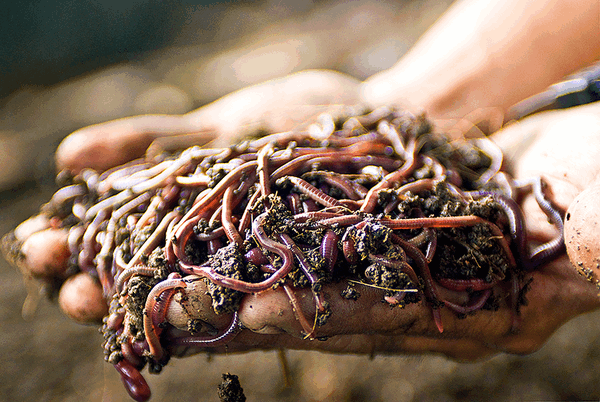The increasing cost of chemical fertilizers with the reduction of yield potential of soil and nutritional value of food due to chemical fertilizing practices lead to an in-depth search for an economically viable alternative.

The use of Vermicast or Vermicompost was identified as the best alternative with regard to industrial and economical viability. It also proved itself as “natures wonder product” to restore soil health and nutritional value in food.
The African nightcrawler (Eudrilus eugenaie) species is being used as a vermicomposting earthworm in the Philippines because it is capable of decomposing large quantities of organic wastes rapidly. It has a reddish brown in color, large and a robust earthworm. It grows rapidly with high rates of reproduction. African nightcrawlers has a life cycle of 50-70 days. Live in at optimal temperature of 25oC (16-30oC) and with optimal moisture of 80% (70-80%) and has a life span of about 1-3 years.
Earthworms lives on shaded, cool areas with temperature between 16-30oC with accessible water and good food source. Earthworms don’t like direct sunlight.
African Nightcrawler Food Sources:
Green Matter (Kitchen/ Public Market biodegradable wastes)
– Grass clippings
– Tree and other yard trimmings
– Fruit and vegetable peelings
– Other remains such as decaying fruit and vegetables
Brown Matter (Agricultural/ industrial biodegradable wastes)
– Leaves, nut shells, sawdust, shredded or chipped wood (not treated), dead flowers and plants, corn cobs, rice straw and corn husk.
Others
– Manure from animals such as cows, swine, horses, carabaos, goats
– Tea bags, coffee grinds
Vermicompost or vermicast is used as a fertilizer in many vegetable farms/ gardens, flower gardens, sugarcane plantations and other annual crops, plant nurseries, landscaping and others because it improves the physical structure of the soil; enriches soil with micro-organisms (adding enzymes such as phosphatase and cellulase; attracts deep-burrowing earthworms already present in the soil; and improves the water holding capacity of the soil.
Steps in Vermicomposting
I. Site Selection
– Proximity to source of materials
– Availability of water
– Flood-free
– Accessibility
II. Sourcing of Materials
– Locally available and low-cost organic or biodegradable materials such as:
– Crop residues
– Livestock wastes
– Grasses/ grass clippings
– Leaves of leguminous trees (e.g, Gliricidia sepium or kakawate and Leucaena leucocephala or ipil-ipil
– Sawdust
III. Preparation of Bed Materials
Most intricate part
– Materials to be used should have the proper C:N ratio
– RVVPC X11 – 50 – 50 ratio (50% manure and 50% other biodegradable materials).
– Place properly mixed materials in bed at 50kg/sqm
– Cover with plastic sheet or several layers of banana leaves to initiate thermophilic (anaerobic) decomposition
– Lasts for 1-2 weeks
– Temperature of the fermenting materials can go up to 70oC
– After 2 weeks, remove plastic sheet/ banana leaves
IV. Sourcing of African Nightcrawler (ANC)
– Initial stock of African Nightcrawler (ANC) can be obtained from private sources
V. Stocking of African Nightcrawler
– After the anaerobic process, the processed materials should be checked prior to the stocking of the ANC.
– Odor of the bedding should be sweet-smelling and not pungent.
– Temperature should be that of ambient.
– Water the bedding materials to lower the temperature
– Stock the African Nightcrawler (ANC) at 1kg/m2
VI. Care and Maintenance
– Upon stocking, mulch the bed with rice straw or banana bracks.
– Water the beds as needed to maintain moisture level particularly during the dry season.
– Place nylon net over the beds for protection from birds, toads, lizards.
– Eliminate centipedes and beetle grubs
VII. Harvesting and Processing
– Timely harvest is important
– Harvest after 30-45 days from stocking
– Stop watering the bed 5-7 days before harvesting
– Separate the African Nightcrawlers (ANC) from the vermicompost
– Height of the bedding will be about 50% or less
– Sieved manually or mechanically to separate the coarse from the fine materials.
– Air-dry on the concrete floor or laminated matting in a covered shed (1-2 days)
– Texture of the processed material is fine and friable
VIII. Packing
– Pack fine vermicompost in plastic bags and place in sacks for storage
– Coarse vermicompost can be bagged in 50kg sacks and sold as soil amendment or for potting mix.
IX. Marketing
– Vermicompost or vermicast can be sold to farmers who are into organic farming.
– Vermicompost can be sold at Php320.00/ sack
– African Nightcrawlers (ANC) can be sold from Php250.00 to Php500.00/ kg
Resource person: Ne B. Velasco, DVM
Sultan Kudarat Polytechnic State College, Tacurong City
Enterprise Development Training on Swine and Poultry for OFWs
DA-ATI RTC XII, San Felipe, Tantangan, South Cotabato
we are selling african night crawlers if interested pls call 0919-5332202